| Listing 1 - 8 of 8 |
Sort by
|
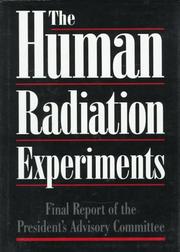
ISBN: 0195107926 Year: 1996 Publisher: New York ; Oxford ; Athens Oxford University Press
Abstract | Keywords | Export | Availability | Bookmark
 Loading...
Loading...Choose an application
- Reference Manager
- EndNote
- RefWorks (Direct export to RefWorks)
Human Experimentation --- Radiation Effects --- Radiotherapy --- Radioisotopes --- Human experimentation in medicine --- Radiation victims --- Nuclear medicine --- Medical ethics --- Gene therapy --- Expérimentation humaine en médecine --- Victimes irradiées --- Médecine nucléaire --- Ethique médicale --- Radiothérapie --- diagnostic use --- Expérimentation humaine en médecine --- Victimes irradiées --- Médecine nucléaire --- Ethique médicale --- Radiothérapie --- diagnostic use. --- Human Experimentation. --- Radiation Effects. --- Radiotherapy. --- United States --- Radiation --- Physiological effect --- Research
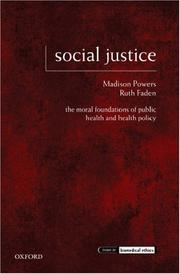
ISBN: 1281529427 0199705194 9780199705191 9780195189261 0195189264 0195375130 9780195375138 9781281529428 0199888442 0197731686 9780199888443 Year: 2006 Publisher: Oxford New York Oxford University Press
Abstract | Keywords | Export | Availability | Bookmark
 Loading...
Loading...Choose an application
- Reference Manager
- EndNote
- RefWorks (Direct export to RefWorks)
This volume develops a theory of social justice for the specific context of health care policy, although it can also be applied to education, economic development and other social policy issues where resources are limited.
Public health --- Medical policy --- Social justice. --- Equality --- Justice --- Health care policy --- Health policy --- Medical care --- Medicine and state --- Policy, Medical --- Public health policy --- State and medicine --- Science and state --- Social policy --- Moral and ethical aspects. --- Health aspects. --- Government policy --- Discrimination in medical care.
Book
ISBN: 0190053984 9780190053987 Year: 2019 Publisher: New York: Oxford university press,
Abstract | Keywords | Export | Availability | Bookmark
 Loading...
Loading...Choose an application
- Reference Manager
- EndNote
- RefWorks (Direct export to RefWorks)
Madison Powers and Ruth Faden here develop an innovative theory of structural injustice that links human rights norms and fairness norms. Norms of both kinds are grounded in an account of well-being. Their well-being account provides the foundation for human rights, explains the depth of unfairness of systematic patterns of disadvantage, and locates the unfairness of power relations in forms of control some groups have over the well-being of other groups. They explain how human rights violations and structurally unfair patterns of power and advantage are so often interconnected. Unlike theories of structural injustice tailored for largely benign social processes, Powers and Faden's theory addresses typical patterns of structural injustice-those in which the wrongful conduct of identifiable agents creates or sustains mutually reinforcing forms of injustice. These patterns exist both within nation-states and across national boundaries. However, this theory rejects the claim that for a structural theory to be broadly applicable both within and across national boundaries its central claims must be universally endorsable. Instead, Powers and Faden find support for their theory in examples of structural injustice around the world, and in the insights and perspectives of related social movements. Their theory also differs from approaches that make enhanced democratic decision-making or the global extension of republican institutions the centerpiece of proposed remedies. Instead, the theory focuses on justifiable forms of resistance in circumstances in which institutions are unwilling or unable to address pressing problems of injustice. The insights developed in Structural Injustice will interest not only scholars and students in a range of disciplines from political philosophy to feminist theory and environmental justice, but also activists and journalists engaged with issues of social justice.
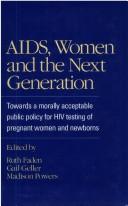
ISBN: 0195065727 Year: 1991 Publisher: New York Oxford Oxford University Press
Abstract | Keywords | Export | Availability | Bookmark
 Loading...
Loading...Choose an application
- Reference Manager
- EndNote
- RefWorks (Direct export to RefWorks)
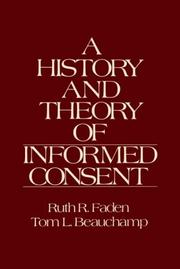
ISBN: 0195036867 9780195036862 Year: 1986 Publisher: New York
Abstract | Keywords | Export | Availability | Bookmark
 Loading...
Loading...Choose an application
- Reference Manager
- EndNote
- RefWorks (Direct export to RefWorks)
Informed consent (Medical law) --- History --- History. --- Medical law --- United States --- Informed Consent --- 351.84 --- -#GBIB:CBMER --- Consent, Informed --- Consent to treatment --- Disclosure, Medical --- Medical disclosure --- Treatment, Consent to --- 351.84 Sociaal zekerheidsrecht. Sociaal bestuursrecht. R.S.Z.--(sociale verzekering zie {369}) --- Sociaal zekerheidsrecht. Sociaal bestuursrecht. R.S.Z.--(sociale verzekering zie {369}) --- history --- #GBIB:CBMER --- Consent (Law) --- Medical ethics --- Medical personnel --- Patient education --- Involuntary treatment --- Patient refusal of treatment --- Malpractice --- United States of America --- Consentement (droit) --- Consentement eclaire (droit medical)

ISBN: 1280439289 1423763521 0199748659 1601295898 9781423763529 9781601295897 9780195036862 0195036867 9781280439285 0195036867 9780199748655 Year: 1986 Publisher: New York : Oxford University Press,
Abstract | Keywords | Export | Availability | Bookmark
 Loading...
Loading...Choose an application
- Reference Manager
- EndNote
- RefWorks (Direct export to RefWorks)
A timely, authoritative discussion of an important clinical topic, this useful book outlines the history, function, nature and requirements of informed consent, focusing on patient autonomy as central to the concept. Primarily a philosophical analysis, the book also covers legal aspects, with chapters on disclosure, comprehension, and competence.
Informed consent (Medical law) --- Consent (Law) --- Declaration of intention --- Justification (Law) --- Consent, Informed --- Consent to treatment --- Disclosure, Medical --- Medical disclosure --- Treatment, Consent to --- Medical ethics --- Medical personnel --- Patient education --- Involuntary treatment --- Patient refusal of treatment --- History. --- Malpractice --- Informed consent (Medical law) - United States - History
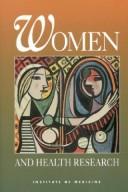
ISBN: 0309050405 9786610195732 1280195738 030958650X 0585137560 030904992X 9786610195800 1280195800 0309586216 0585023662 9780585023663 Year: 1994 Publisher: Washington, D.C. National Academy Press
Abstract | Keywords | Export | Availability | Bookmark
 Loading...
Loading...Choose an application
- Reference Manager
- EndNote
- RefWorks (Direct export to RefWorks)
Human experimentation in medic. --- Human experimentation in medicine --- Women --- Law and legislation. --- Moral and ethical aspects. --- Health and hygiene --- Research --- United States. --- Civil Rights --- Compensation and Redress --- Federal Government --- Patient Selection --- Registries --- Prenatal Exposure Delayed Effects --- Diethylstilbestrol --- Advisory Committees --- Government Regulation --- Policy Making --- Research Subjects --- Women's Health --- Prenatal Injuries --- Stilbenes --- Benzylidene Compounds --- Benzene Derivatives --- Hydrocarbons, Aromatic --- Hydrocarbons, Cyclic --- Hydrocarbons --- Clinical Protocols. --- Medical laws and legislation --- Human females --- Wimmin --- Woman --- Womon --- Womyn --- Females --- Human beings --- Femininity --- Ethics, Medical. --- Women's Health. --- legislation. --- Moral and ethical aspects --- Law and legislation
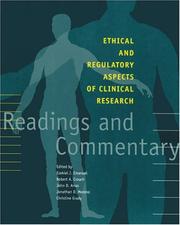

ISBN: 0801878136 9780801878138 Year: 2003 Publisher: Baltimore Johns Hopkins University Press
Abstract | Keywords | Export | Availability | Bookmark
 Loading...
Loading...Choose an application
- Reference Manager
- EndNote
- RefWorks (Direct export to RefWorks)
All investigators funded by the National Institutes of Health are now required to receive training about the ethics of clinical research. Based on a course taught by the editors at NIH, Ethical and Regulatory Aspects of Clinical Research is the first book designed to help investigators meet this new requirement. The book begins with the history of human subjects research and guidelines instituted since World War II. It then covers various stages and components of the clinical trial process: designing the trial, recruiting participants, ensuring informed consent, studying special populations, and conducting international research. Concluding chapters address conflicts of interest, scientific misconduct, and challenges to the IRB system. The appendix provides sample informed consent forms. This book will be used in undergraduate courses on research ethics and in schools of medicine and public health by students who are or will be carrying out clinical research. Professionals in need of such training and bioethicists also will be interested.
Human experimentation in medicine --- Clinical trials --- Medical ethics --- Moral and ethical aspects --- Medical ethics. --- Ethics, Research. --- Research Subjects. --- Moral and ethical aspects. --- Biomedical ethics --- Clinical ethics --- Ethics, Medical --- Health care ethics --- Medical care --- Medicine --- Bioethics --- Professional ethics --- Nursing ethics --- Social medicine --- Controlled clinical trials --- Patient trials of new treatments --- Randomized clinical trials --- Trials, Clinical --- Clinical medicine --- Research --- Human experimentation in medicine - Moral and ethical aspects --- Clinical trials - Moral and ethical aspects
| Listing 1 - 8 of 8 |
Sort by
|

 Search
Search Feedback
Feedback About UniCat
About UniCat  Help
Help News
News